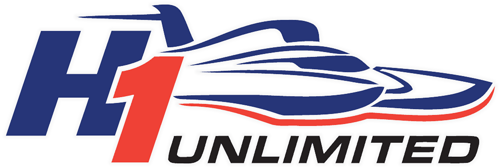H1 Board Approves 80 MPH Rule Clarification
The Board of Directors of H1 Unlimited has approved a clarification for the sport’s minimum-speed rule with the hope that it will make the rule easier for fans to understand, make enforcement of the rule fairer, and eliminate unintended consequences of the rule. The directive will be in place for the Columbia Cup at the Tri-Cities this weekend, for the APBA Gold Cup in Seattle the following weekend, and will be incorporated into future rule books.
Under the sport’s current rules, a hydroplane is disqualified if it drops below 80 mph for more than five seconds before the start of a race. The Board has now adopted an enhancement to that rule that directs race officials to “disregard any violation that does not result in a starting advantage.”
Before the start of each race, the drivers maneuver their boats in an effort to claim a lane that they will have as they approach the starting line. Tim Austin, chairman of the H1 Board, explained that the minimum-speed rule was put in place several years ago to prevent drivers from slowly creeping along in an inside lane in order to claim that lane and have an advantage when the race starts. But, in practice, the rule has also disqualified boats that went slowly for reasons that did not give them a starting advantage.
“The purpose of the rule clarification is to avoid the unnecessary disqualification of boats that violate the 80-mph rule but don’t achieve an advantage by doing so,” Austin said. “For example, a boat that violates the 80-mph rule but starts in an outside lane, should not be disqualified.”
Austin also suggests that drivers who know that they have dropped below 80 mph while preparing for the start of a race should consider moving to an outside lane prior to crossing the starting line in order to avoid being disqualified.
“Our referees have a difficult job because things happen very fast on the racecourse and because they have such a huge area to watch,” Austin said. “They have enforced this rule exactly how it is written, but that has sometimes led to controversy. We hope this clarification will not only assist our officials but also help our fans better understand and appreciate the reason for the rule.”
H1 Board Approves 80 MPH Rule Clarification
The Board of Directors of H1 Unlimited has approved a clarification for the sport’s minimum-speed rule with the hope that it will make the rule easier for fans to understand, make enforcement of the rule fairer, and eliminate unintended consequences of the rule. The directive will be in place for the Columbia Cup at the Tri-Cities this weekend, for the APBA Gold Cup in Seattle the following weekend, and will be incorporated into future rule books.
Under the sport’s current rules, a hydroplane is disqualified if it drops below 80 mph for more than five seconds before the start of a race. The Board has now adopted an enhancement to that rule that directs race officials to “disregard any violation that does not result in a starting advantage.”
Before the start of each race, the drivers maneuver their boats in an effort to claim a lane that they will have as they approach the starting line. Tim Austin, chairman of the H1 Board, explained that the minimum-speed rule was put in place several years ago to prevent drivers from slowly creeping along in an inside lane in order to claim that lane and have an advantage when the race starts. But, in practice, the rule has also disqualified boats that went slowly for reasons that did not give them a starting advantage.
“The purpose of the rule clarification is to avoid the unnecessary disqualification of boats that violate the 80-mph rule but don’t achieve an advantage by doing so,” Austin said. “For example, a boat that violates the 80-mph rule but starts in an outside lane, should not be disqualified.”
Austin also suggests that drivers who know that they have dropped below 80 mph while preparing for the start of a race should consider moving to an outside lane prior to crossing the starting line in order to avoid being disqualified.
“Our referees have a difficult job because things happen very fast on the racecourse and because they have such a huge area to watch,” Austin said. “They have enforced this rule exactly how it is written, but that has sometimes led to controversy. We hope this clarification will not only assist our officials but also help our fans better understand and appreciate the reason for the rule.”

